Updated for 2024
Volunteering abroad and high school exchanges are an excellent way for teens and high school students under age 18 to learn about other cultures, build new interests, and of course—do some good. I first learned about volunteer travel programs for teens in college, when my friend’s 15-year-old sister, Hailey, traveled to Costa Rica to study sea turtles. We’ll use Hailey’s experience volunteering abroad to learn about the process of finding a teen travel program, the importance of safety for teens volunteering overseas, and recommendations for specific under age 18 volunteer programs, including service trips to Cuba, which are becoming extremely popular now.
Hailey’s parents agonized over whether to allow their daughter to travel without them, and must have asked hundreds of questions to teachers, other parents, and the tour group before they signed her permission form.
Safety is naturally a big concern for parents who are thinking about letting their teens volunteer abroad and finding a program that caters to teens and has robust volunteer safety practices in place is critical in researching programs. A perfect example of such a program is International Volunteer HQ (IVHQ), one of the world’s largest volunteer abroad programs. Nearly 20% of IVHQ’s volunteers are teenagers and they offer 16-17 year olds the opportunity to travel independently to 17 destinations around the world.
GoEco has curated teen programs with chaperone supervision and tours for those who are 15-17 years old for projects ranging from animal care to conservation programs. They also have a list of special programs to participate with parental consent. Another great program for teens is Projects Abroad, which sets the Gold Standard for safety amongst volunteer service providers. Projects Abroad offers safe, dependable trips for high school students. Furthermore, many of their volunteer trips and language courses are open to travelers age 16 and up. Volunteering Solutions is another excellent option for younger travelers. Check out their best summer volunteer programs, or wildlife conservation projects for outdoor adventures! The minimum age for most of their programs is 17, and roughly 18% of their volunteers are aged 17-18. They offer 24/7 emergency support and thoroughly vet their projects and host families.
After two weeks abroad with her classmates, Hailey came back thrilled with the work she accomplished, the new friends she made, and the opportunity to put her Spanish lessons to practical use. Given Hailey’s interest in expanding her Spanish language skills, an alternative option that her parents may have considered is Maximo Nivel’s Summer Spanish Camp in Costa Rica, which is a highly structured program to learn Spanish, participate in sports, explore Costa Rica, and engage in community service in a safe and guided environment (i.e. 24/7 chaperones).
Parents: whether you have a teen who is looking for a Peace Corps alternative and wants to volunteer abroad with a school or youth group, or if you’re looking for a new twist on family vacations, this article is for you. We have curated a select group of volunteer organizations that offer projects for teens who are 16+ or offer high school volunteer abroad programs.
Is Under 18 too Young to Volunteer Abroad?
Volunteer programs have different requirements as to how young a volunteer participant can be. For example, the Peace Corps requires that participants be at least 18 years old and most of their projects require a college degree. Some programs may also require an adult guardian to be present if the volunteer is under 18.
International Volunteer HQ offers 17 teen volunteer programs around the world, including pre-departure support and unrivaled safety and support services.
GoEco offers lots of meaningful travel opportunities, including special programs designed for 15-18 year olds, which have been carefully selected and include a higher level of supervision.
Maximo Nivel is another highly respected volunteer organization that accepts participants as young as 15 through its “Spanish Camp” program. Teens can participate in a Spanish immersion program and have the option to spend 3 to 4 hours each volunteering in the host community as well.
Projects Abroad offers high school specials for teens (ages 15 to 18 years) interested in joining students from around the world on programs in Nepal, Thailand, and Argentina.
African Impact a highly respected volunteer organization that has been sending volunteers overseas since 2004, is an alternative to the Peace Corps and offers volunteer programs for participants as young as 16. African Impact offers 20 different types of projects for under 18 volunteers, ranging from marine conservation in Tanzania to teaching English in South Africa.
Benefits of Teen and Under-18 Volunteer Abroad Programs and High School Exchanges
Let’s take a look at a few benefits of under 18 volunteering abroad or participating in an exchange program as a teenager/high school student:
Community Service Experience
Volunteering overseas lends a new perspective to community service, and for high school juniors and seniors, may help boost college applications. With increasingly competitive university acceptance rates, volunteering abroad—coupled with projects in your own community—has the potential to set one student apart from another.
For students who aren’t very interested in volunteering near home, coupling a service project with a vacation is just one way to inspire them to help those in need. I have friends who never volunteered (unless their parents dragged them along) until taking a service trip with their church or class. After that first project volunteering abroad under 18 years old, they were hooked: many of them changed the colleges they applied to or the majors they declared after volunteering in another country.
Cultural Immersion
The other day I overheard an interview between a campus recruiter and a second-semester freshman. The recruiter needed testimonials for the university website, and the conversation kept coming back to, “I’m so glad to be in such diverse community.”
She’d never traveled outside of the Midwest, and when she made new friends from other countries, or who took vacations abroad on the regular, she felt the need to “catch up.” She valued their experiences, and wished she’d been able to build her own earlier. I would suspect a great number of students feel this way—and being able to do good even for a short time in a different community can make a lifelong impact.
Skill-Building
How many of us have taken foreign language lessons in high school? And how many of us have applied those skills outside of trivia night?
Hailey, who I mentioned earlier, took three years of Spanish classes before ever needing to use the language outside of school. Traveling to Costa Rica gave her the opportunity to challenge herself, and she made a conscious effort to speak Spanish as much as possible. When she came back, she was obviously much more comfortable in her phrasing and I wouldn’t be surprised if her Spanish grades improved that year.
That’s just one example. Teenage volunteering abroad experiences also help with:
Time management: How do you make sure you get to the 8:15 bus in a place you’ve never been? Budgeting for getting lost, making it to your project on time, and being aware of how long you have to complete it help build valuable time management skills that will be needed later.
Navigation: Same question as above! If you’re in a community very different from your own—maybe one that’s in a rural area while you’ve always lived in a city—can challenge and grow navigation skills.
Communication: Even if your host family or the country you’re in predominantly speaks English, there may be cultural barriers to overcome. Learning to speak with people from different backgrounds is an excellent way to build and refine communication skills.
Teamwork: How do you complete a project with people you may not have met before? And how will you know what to do if it’s a new project, one without lots of clear instructions, or one in which you have zero experience? It can be a daunting prospect even for adults, and you can be sure teamwork goes a long way toward finishing the project (and doing it well!).
Service Learning as a Component of Youth Volunteer Abroad Programs
Service learning is a growing movement to couple educational activities with volunteering. Teenage volunteer abroad participants and high school students gain a better understanding a subject while making an impact on their community and developing a sense of personal responsibility in their work.
Through service learning, students follow a lesson plan created by their school or other educational program, while having flexibility and creative input into a service project spearheaded by a community-based group. This hands-on approach to learning also engages teens in reflection and discussion about what they’d like to accomplish through their project, how they can change or improve along the way, and what impact their project had in the end.
At the end of this article is a list of volunteer abroad programs that include service learning. You also can learn more about service learning from the National Youth Leadership Council.
How to Choose a Teen Volunteer Abroad Program
Find Organizations that Specialize in Teen Volunteer Programs
There are literally thousands of volunteering abroad organizations in the world yet few specifically cater to under 18 volunteers. Be sure to stick with organizations that offer special programs for teen volunteers.
Global Vision International hosts thousands of under 18 volunteers each year and have an impeccable track records in keeping their young participants healthy and safe. So how do you go about choosing the right student travel program? In most ways, you’ll want to use the same checklist for any other volunteer project:
Set Realistic Expectations
This is tricky for teens and adults alike—what you want to do might not gel with what a volunteer organization needs. And because of age and experience, teens have far fewer options available. Service learning programs are built specifically to be age-appropriate and effective, while general volunteer programs that don’t require much experience—think painting murals or gardening—are perfect for families and groups. It’s also important to keep in mind that programs geared towards volunteering abroad for teenagers are short-term, learning experiences rather than intensive international development projects.
Set a Schedule
There are far fewer teen volunteer abroad opportunities than are available for adults, and many of them have set start and end dates—often occurring over winter, spring, or summer break. As you look at different programs, know any schedule constraints you may need to work with, and be sure to plan far enough in advance to coordinate school, work, or other activities.
Research Your Options
Don’t settle for the first program you’ll find in an online search. Large marketing budgets don’t always equate to the most valuable experiences or responsible programs. Look at a variety of volunteer organizations and find the one that makes the most sense for your family or group.
Read Reviews
Volunteer Forever is the perfect place to start! Reading brochures and websites will only get you so far. Learning what other volunteers have to say can mean the difference between choosing an amazing trip and a letdown. Check out the end of this article for a list of teen volunteer programs and reviews right here on Volunteer Forever.
Ask Questions
For an excellent list of questions you should ask any volunteer organization, click here.
A Few Notes about Safety for Under-18 Travelers
My mom still gets a little on edge whenever I travel. I’m not sure it’s something that ever goes away, but after years of solo trips to countries she knows as “The murder capital of the world,” or “Your dad and I had a friend who was killed there in the 80s” I’ve learned how to approach her most common travel fears (and hopefully yours as well). Below are some especially important considerations for participants in under 18 volunteer abroad programs:
“What if you get sick or hurt?” It doesn’t matter if your child is in perfect health and has never had a broken bone in his life—it’s still a legitimate concern and one you won’t shake until he gets back home. Three things to do:
- Check with the tour group to see how they address students’ health while abroad. They should have readily-available information about travel health insurance, local clinics or hospitals, and steps to take in case of emergency. As an example, check out Global Leadership Adventures’ Security and Safety page for answers to common questions about safety, security, and health. Be sure they have the most up-to-date information about your teen as well, including emergency contacts, health insurance provider, and any allergies or other information that could be helpful.
- If you have health insurance, don’t assume your provider will cover trips outside of the country—if it doesn’t, compare other providers and purchase the option that’s right for you. Be sure your teen, the tour group, and any emergency contacts have the most up-to-date information and can get in touch in case something should go wrong.
- Visit a travel clinic to learn about common ailments or injuries that might happen in the country your teen is traveling to, and how to prevent them. You can find a list of travel clinics here.
“What if you get attacked?” This one is tough, but the best way to allay those fears may be to talk it over with the tour group, with other parents who’ve sent their teens abroad, and if you can, with your teen’s host family or other contacts in-country. The chances of anyone on the tour being attacked might be the very same (or even lower) as in your home community, but be sure to do your research, and be certain your child knows how to avoid potential danger by staying with his group, by protecting his belongings, and by behaving appropriately for the community he’s in.
“What if you lose your money/bags/passport/other important items?” This piggybacks on the last point: be sure your teen knows basic safety practices while abroad. Things like not leaving his bag sitting on a table, or resting his cell phone on top of his belongings where it can easily be snatched. Make sure he knows who to talk to as soon as he knows something has gone missing—as with health info, the tour provider should have a plan already in place should someone’s items get lost or stolen.
“How will I know you’re ok?” This has always been the biggest sticking point for my parents. If they don’t hear from me at least once a day on my travels, they worry. And that’s been tough when I’m in the jungle or trying to scale the Great Firewall of China. I’ve gotten in massive fights with them over calling and emailing because here’s the thing: who the heck calls or writes email updates every day? Do you really need to use those minutes or text charges, and do you really want them to hunt down an Internet cafe for an email? Here’s a middle ground—just ask them to update their status on Twitter or Facebook, or text you on WhatsApp. Chances are they’re probably going to do that anyway, and by seeing Facebook photos and “Ziplining #thisisawesome” fly by on Twitter, you’ll know they’re doing fine.
Here are a few more resources to check out:
Recommended Teen Volunteer Abroad Programs
Trending Guidebooks
Volunteering Abroad AFTER the Coronavirus Outbreak
Read 26,562 times2025 Best Internships Abroad: Medical Care, Marine Biology & More
Read 93,187 timesVolunteer in Australia: Animals, Conservation, Ranching and More
Read 51,044 times2025 Best Volunteer Abroad Programs, Organizations, and Projects
Read 3,668,361 times
International Volunteer HQ (IVHQ) is an excellent opportunity for teens to volunteer overseas. Since 2007, IVHQ has placed over 130,000 volunteers on impactful and affordable projects in dozens of countries worldwide. With an emphasis on sustainability and safety, IVHQ partners with local NGOs to host volunteers of a wide variety of programs, ranging from wildlife and animal care, to teaching, to sports coaching, and much more. These programs are not only educational, but also opening their eyes to other cultures and life experiences.
If your parents are feeling anxious about your plans to travel abroad, check out IVHQ’s supervised Youth Adventure Packages. Designed for teens ages 15 to 17, these are all-inclusive volunteer abroad experiences that have been created and vetted by IVHQ to deliver appropriate volunteering, accommodation, meals, transport, cultural activities, and full-time coordinator supervision and support. Not only will you have safe volunteer experiences, but your parents will also have peace of mind! There are 17 projects around the world for you to choose from!
Here’s an opportunity for teens ages 16-17 to travel independently and volunteer on one of 17 IVHQ teen programs offered abroad. Visit Bali, Portugal, or Costa Rica when you choose IVHQ’s traditional volunteering projects that place you alongside volunteers of all ages.
Volunteer in Bali, and stay in Ubud on the island of Nusa Pen. Projects range from Teaching, Kindergarten, Environmental Education, Health Education, Construction and Renovation, and Turtle Conservation. Accommodation is provided in volunteer houses.
Spend your weekend exploring popular destinations like the beaches of Sanur, Seminyak, or Kuta. Try a cycling or trekking tour on Mount Batur, or immerse yourself in the local culture and visit temples. Program fees start at $385 for one week. Read more here.
Expand your horizons and foster cross-cultural understanding while you volunteer on community projects with your peers! If you’re a teen between the ages of 15 and 18, IVHQ has the perfect project for your high school group in more than 13 programs in Africa, Asia, Central America, South America, Europe, the Caribbean, and the Pacific.
IVHQ can create customized itineraries that provide a safe environment for your high school group to learn, grow and challenge yourselves. IVHQ offers a range of services, such as detailed pre-departure training and access to an alumni network of more than 130,000 volunteers.
You’ll have 24/7 support from local IVHQ partners and teams, airport pickups, and volunteer accommodation in a safe community near your placement. Imagine doing rewarding volunteer work in Cusco, Peru, before taking an unforgettable week-long mini adventure exploring the world-famous Machu Picchu and Sacred Valley! This is one example of a destination that includes important volunteer work that you can perform while on a group trip. Program fees vary depending upon group size. Learn more and apply here!

GoEco teens in Bali
Since 2006, GoEco has offered affordable volunteer abroad programs and internships in over 40 countries throughout Africa, Asia, Australasia, Central America, Europe, the Middle East, and South America. With more than 150 different programs, including programs specifically for teens, and under 18 programs with parental consent, GoEco is a great organization to check out if you’re looking for a variety of impactful trips to choose from, from wildlife conservation to teaching English. As a volunteer, you will have 24-hour support from the GoEco team, from start to finish.
Currently, GoEco is offering a special travel grant where you can stay for the 3rd week free! Check out the eligible projects here!
Discover Costa Rica’s wild treasures and make a lasting impact on marine life through this transformative two-week turtle conservation adventure. Teens aged 15-17 team up to patrol beaches, protect nests, and release hatchlings along the Osa Peninsula’s shores. Beyond volunteering, participants explore lush jungles, admire volcanoes, and immerse in local culture. Guided excursions, city tours, and cultural activities ensure meaningful connections, personal growth, and unforgettable memories under professional, caring supervision.
Experience Bali’s vibrant culture and pristine beaches while saving endangered sea turtles in this dynamic two-week program designed for 15-17-year-olds. Participants actively protect turtle nests, rehabilitate injured turtles, and release hatchlings into crystal-clear waters. Along the way, they gain insight into sustainable tourism, learn Balinese traditions, enjoy snorkeling excursions, and savor local cuisine. With dedicated guidance, teens forge friendships, broaden perspectives, and create lasting memories in an enchanting island paradise.
Immerse in Thailand’s rich culture and support ethical elephant care through this two-week volunteer experience. Teens aged 15-17 assist at a reputable sanctuary, ensuring rescued elephants thrive naturally while contributing to community projects like renovating schools. Participants explore lush forests, taste authentic cuisine, and learn traditional Thai customs. Evening adventures, cultural exchanges, and supervised group outings foster global friendships and personal development, making every moment inspiring and truly unforgettable.
Embark on a two-week Kenyan adventure focused on wildlife, community, and climate resilience. Teens aged 15-17 discover the diversity of Nakuru’s landscapes, monitor endangered species, combat invasive plants, and restore habitats. Alongside local experts, participants learn Swahili, engage with Maasai traditions, and support women’s empowerment initiatives. Guided safaris, cultural dances, and hands-on projects foster global citizenship, environmental awareness, and cross-cultural friendships, leaving volunteers inspired to shape a truly sustainable future.
Combine cultural immersion with hands-on volunteer work in this two-week Balinese adventure. Teens aged 15-17 split their time renovating community spaces in Ubud and protecting sea turtles on Nusa Penida’s shores. They learn basic Bahasa, watch traditional dance performances, explore temples, and taste local delicacies. Supervised activities, team-building games, and beach excursions ensure personal growth and memorable bonds, creating a unique opportunity to improve lives and preserve vibrant marine wildlife.
Embark on a two-week exploration of Ecuador’s natural wonders, blending wildlife rescue and cultural encounters. Teens aged 15-17 volunteer at an Amazonian animal refuge, helping rehabilitate orphaned monkeys, injured birds, and other vulnerable species. Guided trips to Baños, Quilotoa, and Cotopaxi expand horizons. Supervised activities foster friendships, environmental stewardship, and unforgettable experiences in a lush setting.
Maximo Nivel is the top-rated volunteer abroad organization on Volunteer Forever, and for good reason: it offers affordable, safe, and impactful programs perfect for high school students. Maximo Nivel has a variety of volunteer abroad programs and Spanish language courses in Latin America and has hosted over 25,000 participants since it was founded in 2003.
Through its Spanish Camp program, high school students aged 15 and up are invited for a full Spanish language immersion program at COSI, the Costa Rica Spanish Institute.
Maximo Nivel offers a service learning component to language learners, who can spend three to four hours per day volunteering with local communities to support children’s programs, assist with construction projects, or learn about sea turtle conservation. Monday through Friday each week, you’ll take Spanish classes and take part in your volunteering track – on weeknights, you’ll have the wonderful opportunity to take part in salsa lessons, movie nights, and much more.
Included with the program is airport pickup and drop-off, 24/7 in-country support, 8:1 student-chaperone ratio, housing with a host family, private transport for all activities, and program and safety orientation. To learn more about Maximo Nivel’s Spanish Camp, visit: http://maximonivel.com/spanish/spanishcamp
Through Maximo Nivel’s high school abroad program, you’ll spend a full semester or full year at an accredited, private high school in Costa Rica. All of your classes are taught in English, while Spanish is taught as a second language.
You also may be able to earn credit toward the International Baccalaureate Diploma, and take AP courses. During your stay, you’ll live with a host family and have assistance from a cultural advisor to help navigate you through cultural and language differences – plus, you can take part in optional tours, social events, and much more to gain the most from your adventure in Costa Rica.
This study abroad program includes airport transfer, housing, meals, school tuition and textbooks, orientation, private Spanish classes, and much more. Click here to learn more: http://maximonivel.com/study-abroad/high-school/
Maximo Nivel offers several different travel options for high school groups, including volunteering abroad, a volunteer adventure, and a native Spanish program. Your itinerary can be designed to focus on Spanish language, service learning, cultural travel, or any combination of those programs, and all trips are carefully supervised by Maximo Nivel staff who are here to focus on your educational goals. Trips are available for summer, winter, and spring breaks, or year-round. Click here to learn more: http://maximonivel.com/groups/high-school/
For two weeks, you’re invited on Maximo Nivel’s volunteer adventure, which includes five days of community service and six days of travel through Costa Rica, Guatemala, or Peru. Volunteer activities you can take part in include working with kids, teaching English, construction, conservation, animal care, or medical / healthcare.
In Costa Rica, you’ll go on a cultural night or city tour; 3-in-1 tour of Poas Volcano, La Paz Waterfall, and coffee tour; a catamaran Tortuga Island tour, and a trip to Manuel Antonio National Park.
In Guatemala, you’ll go on a hike to Volcano Pacaya, take surf lessons in El Salvador, embark on a zip line tour, and spend the night in Tikal.
And in Peru, you’ll take a Cusco city tour, Sacred Valley tour, a two-day tour of Machu Picchu, and a two-day tour of Lake Titicaca and Puno. Learn more about Maximo Nivel’s volunteer adventure trips here: http://maximonivel.com/adventure/full/
With Projects Abroad, you’re never too young to discover the world of volunteering. That’s why this organization has specially designed trips for teens. Their team will be with you every step of the way to make sure you’re safe to get the most out of your trip, and they even offer some escorted flights to certain destinations!
Check out some volunteer projects below. Program fees start from $925 per week.
If you’re between 15-18 years old, you can team up with like-minded teens from around the world. Together with new friends, you’ll experience life in a different country and help disadvantaged communities or protect the planet. And, you’ll gain self-confidence to help you pursue future dreams and overcome challenges. These trips are ideal for gaining community service credit.
High School Special trips have fixed dates with set itineraries filled with fun and high impact activities – here are a few of the most popular trips:
Projects Abroad’s staff go above and beyond to make sure teens, parents, and teachers feel confident about the trip. If it’s your first time overseas, staff will give you all the support you need to have an amazing time.
What volunteers say – Review from Cassia
“Working with children is magical. Having worked with those children made me a better person. They were all so friendly, always offering us a happy smile when we played together. Two weeks sounds like a very short period of time, but they were enough for me to miss them.”
African Impact is a responsible, sustainable volunteer travel organization that has won multiple industry awards, including being voted the world’s Top Volunteer Abroad Organization by volunteers on GoAbroad four years in a row. Since 2004, they have hosted over 35,000 participants on 20 projects across 7 countries. The organization believes in the spirit of Africa and that the volunteer experience is just as important as the impact made. It is also recognized as a trusted specialist on volunteering and interning in Southern Africa. African Impact offers internships, as well as group, family, and high school projects. The minimum age requirement for their projects is 16, making African Impact a great option for teen and high school volunteers.
African Impact manages its own projects and is able to provide tangible, real achievements on a regular basis. The organization has a clear Child Protection Policy and ensures that volunteers complete a criminal record check prior to involvement. Experienced staff is on the ground to support volunteers day-in-day-out and the organization does not use volunteer support in replacement for a local person.
In addition to making a positive impact, African Impact also believes that volunteering abroad should be enjoyable. The organization offers a range of activities for volunteers, including teaching children in South Africa, assisting with wildlife conservation in Zimbabwe, working in hospitals or clinics in Kenya, and carrying out dolphin and marine research in Zanzibar.
The Early Childhood Development Project in Cape Town offers volunteers the chance to work with vulnerable children in underprivileged townships. Volunteers will support children in foster care homes and pre-schools, providing them with access to education and care that they may not otherwise have access to. The project aims to make a positive, long-term impact on the lives of disadvantaged children by providing them with the support and education they need to succeed.
In addition to working with children, volunteers will have the opportunity to explore the beautiful city of Cape Town and all it has to offer. Cape Town has been named the Most Beautiful City in the World for the past 5 years, and is known for its stunning natural beauty, diverse culture, and vibrant nightlife. Volunteers can take advantage of the many activities available in the city, such as hiking up Table Mountain, going paragliding, kayaking in the ocean, or visiting historic sites such as Robben Island.
Volunteers will live in a spacious guesthouse in the center of town, with shared dorm-style accommodation and shared bathroom facilities. The guesthouse is close to the main sights of Table Mountain, the V&A Waterfront, and the Company’s Gardens. A team on site will be available to support volunteers and help them with any needs they may have during their stay.
Thinking of majoring in education? Find out if teaching is right for you with a teaching placement in Tanzania with African Impact. If you’re 16 years or older, you can provide assistance in under-resourced primary schools, helping students practice their English-speaking skills, and tutoring students with math. You’ll also provide support to remedial classrooms for persons with disabilities, and mark tests, check homework, and prepare learning material for the next day. Get the children active by playing sports – particularly football and netball – while supervising and coordinating activities.
While in Zanzibar, visit the Zanzibar Butterfly Center or Cheetah’s Rock, a fantastic wildlife sanctuary that lets you get hands-on with rehabilitating animals. Take a trip to see the monkeys at the Jozani Chwaka Bay National Park, or relax on one of many beautiful beaches. Learn more and register today!
Dolphin and Marine Conservation Project
Volunteer in Zanzibar on African Impact’s Dolphin and Marine Conservation Project and make a real difference to the sustainability of dolphin tourism. As a volunteer, you will monitor human-dolphin interactions, promote ethical dolphin tours, and contribute to the conservation of marine life in the area. This project is ideal for those passionate about marine conservation and the environment. In your free time, you can explore the beautiful coastlines and vibrant culture of Zanzibar. You will live in a private volunteer house near the coastal village of Kizimkazi and work with local communities and organizations to protect the marine ecosystem. This is a unique opportunity to make a lasting impact while enjoying a truly amazing location.
Searching for a transformative volunteer abroad experience? Involvement Volunteers International (IVI), established in 1989, is a non-profit and charity that beckons individuals to be part of 25,000 volunteers who’ve positively impacted 112 projects in 23 countries. They have an excellent safety record, in-country 24/7 support & emergency assistance. Most programs accept 16+, but would need parental consent. Take a look at the below programs suitable for teens.
If your teen is interested in a career working with children, then consider this program to give them experience working with kids. Travel to the Coral Coast in Fiji to assist teachers with primary aged children. Volunteers will help in assisting classes for 4-7 year olds alongside a teacher in teaching basic English, plan activities to encourage and engage learning English, and play with the children. Building a relationship with these kids will make an impact in each other’s lives. Coral Coast is famous for its beautiful beaches and coastlines with plenty of activities to do such as surfing, and other water activities. It will be hard to get bored for your teen! Start planning for this adventure here!
Check out this program if your teen loves the beach and turtles. This popular program is located on the beautiful island of Nusa Penida, which is a 45 minutes boat ride away from Bali. Volunteers will help endangered sea turtles by collecting data on turtle population, clean & feed turtles, collecting eggs, and monitoring their nests. In addition, they will also help with cleaning up the beaches, helping the local community with practicing English, and educating on environmental issues. Activities to do during your free time will be plenty such as hiking, diving, snorkeling, island hopping, or just relaxing on the beach. For more information on how to plan a vacation with volunteering, click here!
Here is another amazing project for teens to help disadvantaged kids in Cuzco, Peru. This project will undoubtedly open volunteers’ eyes to the hardships (especially lack of education) that children may face in less developed countries. The minimum age requirement is 16+. Volunteers will help teach English to children, teens, and adults in different settings such as schools, day cares, and community centers.You will get to learn how to create daily lessons and educational activities. The teaching can be one-on-one or group classes. And don’t worry if you do not have experience with teaching, you will be provided a crash course in ESL teaching. And in your free time, immerse yourself in the local culture, with many sightseeings in this ancient civilization. For more information, visit IVI here!
Volunteering Solutions (VolSol) offers lots of amazing travel opportunities for high schoolers who want to explore the world and make a positive impact through community service. Founded in 2007, VolSol has placed nearly 17,000 volunteers on 150 meaningful projects in 27 countries worldwide. And with a starting fee of just $200, Volunteering Solutions is one of the most affordably-priced volunteer organizations in the world – even offering travel insurance for just $12 per week.
You can find lots of teen, high school, and family volunteering opportunities through VolSol – and the three programs listed below are just a few of the amazing projects you can sign up for that are monitored by VolSol staff, who make sure these trips are safe and provide the very best experience possible for first-time travelers.
Wildlife Conservation in South Africa
If you love animals, VolSol’s wildlife conservation opportunity in South Africa may be the perfect choice for you! For two weeks to two months, you’ll have the chance to work at a wildlife reserve that’s home to Africa’s Big 5 species and many more. While your tasks will depend on what’s needed by the project when you sign up, you may be able to help with lion tracking and monitoring, tree planting and landscaping, elephant sanctuary support, wilderness trail walks and patrols, game counts, and much more.
This program starts from $1,100 for your first two weeks, and is an amazing way to learn about wildlife conservation, enjoy safaris and game drives, and so much more.
Summer Volunteer Program in Thailand
Volunteering Solutions’ Thai volunteer and adventure tour is an incredible way to explore Thailand and experience its culture while helping a local community through volunteer work. You’ll start your trip with a weekend in Bangkok, and after that you’ll travel to Surin, where you’ll learn about Thai history, daily life, and so much more while volunteering at a local child care center. You’ll play games with children, and help with renovating and improving the facility so the children can learn and play in a safe, fun environment – and later during your tour of Surin, you’ll have the chance to volunteer with elephants, visit Khao Yai National Park, and embark on a jungle trek. If you decide to stay for a full month on your Thailand adventure, you’ll spend your final week at the gorgeous beaches of Koh Phangan. Learn more here!
Volunteer Vacation in Nepal
VolSol has several different volunteer vacation options in Nepal, including a language and orientation week, a summer volunteer adventure, an orphanage program, and a teaching placement. VolSol’s summer adventure in Nepal is perfect for high school travelers who want to visit this amazing country in the Himalayas while volunteering with a local community.
This 22-day program starts with an orientation in Kathmandu, where you’ll start your volunteer experience at an orphanage, school, or center for mentally or physically disabled children. As a volunteer, you can provide care and affection, help with basic English lessons, guide the children with basic hygiene practices, and take them out on small excursions. You’ll also take city tours, visit gorgeous and historic temples, embark on a safari, go sightseeing, and so much more. Click here to learn more about volunteering in Nepal!
Founded in 1997 by Richard Walton, Global Vision International (GVI) is an award-winning organization that provides volunteer and internship opportunities in Africa, Asia, Australasia, Europe, Latin America, and North America. GVI is unique from other volunteer programs in three ways: they operate their own volunteer projects to ensure real, sustainable impact on the ground; they provide 360 degree support before, during, after your placement; and lastly their alumni network provides increased access to higher education and career development opportunities.
In addition, as a parent-run organization, GVI prioritizes volunteer safety, especially for its under 18 programs. Since 2012, they have provided ethical and responsible programs for teens, with health and safety as their top priority. GVI’s compliance with British Standards 8848 demonstrates their commitment to safety, as they take extra measures to ensure the safety of their teen volunteers. This makes their programs appealing to parents who trust them to care for their children. Here are some samples of their teen programs.
This popular program is for 15-17 year olds to learn about rainforest conservation in Gandoca, on Costa Rica’s Caribbean coast. This program will get your teen physically active while exploring Costa Rica’s natural environments such as jungles, mangrove forests, and beaches by hiking, swimming, and boating. They will see many native Costa Rican wildlife during their adventures while learning about wildlife conservation. They will also learn leadership skills, teamwork, resilience, etc through many projects such as the sea turtle surveillance program, mangrove forest restoration, and climate change. Power is limited, so they will get to enjoy the abundant wildlife surrounding them as the reserve is in the middle of the jungle! Get your teen excited by reading other teens’ reviews and videos of this project!
Here is another amazing opportunity for your teen. This teen volunteer program located in Southern Thailand, for 15-17 year olds, allows them to experience Thai culture while helping a local sea turtle conservation center and renovating schools. Specifically, the tasks will include cleaning sea turtle habitats, providing medical treatment to green sea turtles, and recording their growth; as well as cleaning up the nearby beaches, and helping to renovate local schools. For fun, they will have guided tours of the region, learn about responsible tourism, and visit national parks, and Phuket. Click here to get started and make friends around the world!
Is your teen interested in marine biology and marine life or interested in getting PADI certified? This is an exciting opportunity to learn about marine conservation and what it is like being a marine biologist. This volunteer program is based in Mexico’s Riviera Maya, where the Mesoamerican Barrier Reef is located. There are many projects that your teen can participate in such as coral reef monitoring, endangered sea turtle research, and beach clean ups. The program also includes training and practice for PADI Open Water certification in the beginning of the program. For more details such as itinerary and costs, visit GVI!
Here is another marine conservation program specifically designed for 15-17 year olds, on the other side of the world, located in Tenerife in the Canary Islands. Instead, this program focuses on dolphin and whale conservation. This program is invaluable to gain knowledge about the effects of climate change, plastic pollution, and other environmental issues. Specific tasks for this volunteer program may include data on mammal health, population numbers, behavioral patterns, and surveys on the water and beaches. Click here for more information!
Another summer volunteering program for high school students is Plan My Gap Year. PMGY offers affordable and impactful volunteer travel opportunities for people of all ages to help with childcare, community projects, wildlife conservation, and much more throughout Africa and Asia. And with awards such as the Shell LiveWire Grand Idea Award, Thailand Green Excellence Award, and Special Recognition from the United Nations in Sri Lanka, Plan My Gap Year prides itself on transparency, safety (all volunteer programs are personally vetted by PMGY staff), and quality placements abroad.
If you’re ready for a tropical adventure, check out PMGY’s Sri Lanka volunteer program. Along with many other volunteer opportunities, PMGY is offering a Sri Lanka Volunteer and Adventure Experience for travelers aged 16 and 17. For two weeks, you’ll explore and volunteer, with highlights including visiting an elephant orphanage, watching leopards at Yala National Park, relaxing on the beach, and volunteering on four different projects focusing on construction, English teaching, elephants, and sea turtles. This program costs $750, plus a $249 registration fee, and includes housing and meals, in-country transport, volunteer handbook, 24-hour UK-based support, and much more. Learn more here!
If you’re looking for a customized experience, Plan My Gap Year offers school trips where you can volunteer, explore, and immerse yourself in a new culture. These all-inclusive, tailored trips are customized to your group’s needs, with a UK expedition leader ensuring that your trip is safe, stress-free, and fun. With trips organized throughout Africa and Asia, there’s so much variety to the types of volunteer projects you can take on, or adventure opportunities you can try out. Learn more about PMGY’s school trips here!
Join other young volunteers with Plan My Gap Year at the Bali Wildlife Rescue Centre, and help care for animals that were victims of poachers and traffickers. Each day, you’ll provide upkeep for the center and care for endangered animals, enriching their lives—and your own—in the process. Tasks include feeding, enclosure cleaning, general maintenance, and spending time interacting with the animals, helping them to socialize to ward off depression and poor behavior. There are nearly 40 types of animals at the center, so there’s no shortage of meaningful ways that you can help out as a volunteer. Fees for this program begin at $270 for one week. Learn more here!
With more than 750 primary schools in the island nation of Fiji, there’s a great need for assistance from volunteers – especially those who speak English. Volunteer in Suva with Plan My Gap Year and help to teach and care for children! They will be excited to learn about your culture and life experiences – as a volunteer, you will assist a local teacher with their day-to-day classes, and may even have the opportunity to take the lead in lessons. Younger students enjoy a relaxed and informal teaching experience, so this is a wonderful chance for volunteers who want to be creative and incorporate singing, storytelling, and dance in the classroom. Stay for two weeks or longer, with an affordable starting fee of $390. Learn more about volunteering in Fiji here!
With more than 20,000 travelers placed on impactful trips abroad since 2009 (and 4,000 in the past year!), Love Volunteers is one of the fastest growing volunteer organizations that you can be a part of right now. All of Love Volunteers’ trips are affordably-priced, starting from $259 for your first week abroad, depending on where you travel. Love Volunteers has placements in 34 countries worldwide, with more than 120 different projects. Some popular destinations include:
While most of Love Volunteers’ programs ask that you be 18 or older to sign up, volunteers aged 17 can travel with consent from a parent, while those under 17 must be accompanied by a parent or guardian.
Located in Kathmandu, this wonderful program aims to provide quality education to some of Nepal’s poorest children. As a volunteer, you will work alongside local teachers to help with subjects such as English, math, science, history, and geography – you also will play games and read to the children in English to help them develop their language abilities for future education and career prospects. You are invited to stay for one week or longer on this volunteer program, and outside of your work, you will have time to explore Nepal’s colorful capital city as well as its beautiful and historic monuments and temples. Learn more and sign up here!
Based in Surin, this volunteer trip gives you the opportunity to care for elephants that have been abused and neglected – first used for logging work, which was outlawed in the 1980s, and later used as tourist attractions to help pay for their care. Through Love Volunteers, you can work with an initiative that takes the elephants out of the cities and cares for them in their natural habitats, while also providing livelihood support for their mahouts. This program starts from one week – click here to learn more!
If you want to visit the beach and do good, check out Love Volunteers’ turtle conservation program in Costa Rica! Through your efforts, you can help save sea turtles from extinction by assisting in hatcheries, helping with conservation projects at the beach, releasing hatchlings into the sea, and patrolling hatching grounds to protect eggs from poachers and predators. This project starts from one week – learn more and apply here!
On this program, you will travel to Mombasa, Kenya to provide classroom support in a primary school or high school, special needs residential school, or a language school for adults. While volunteers with experience and qualifications in education and special needs support generally are placed in the language school and special needs school, those volunteers who are younger or do not have a background in education can find lots of opportunity to work with the younger children through sports, games, and other interactive activities. This program starts from one week – learn more and apply here!
Founded in 2007, A Broader View has placed >24,000 volunteers on meaningful adventures worldwide. This US-based nonprofit organization currently hosts 245 different projects for individuals, groups, and students (high school and college) in 25 countries throughout Latin America, Asia, and Africa.
With more than $3 million donated to impactful programs since A Broader View’s founding, this organization truly aims to make a positive impact through its partnerships and volunteer placements. Depending on where you’d like to travel and for how long you’d like to stay, volunteer placements start from $820 for your first week – with flexible start dates – and may be tax-deductible for travelers from the United States.
A Broader View offers 10- to 28-day trips for students to visit one of 15 different countries throughout Latin America, Asia, and Africa. These trips combine service learning and leadership, allowing you to learn about global development issues, such as poverty or public health, as well as solutions being put forth within the communities you’ll visit.
Through these programs, students and faculty will have the opportunity to develop a curriculum that fits your educational needs, with hands-on volunteering and adventures such as rafting, tours, and hiking incorporated into the trip. 10-day experiences start from $1,400 per student, and include a custom-designed itinerary and curriculum, housing and meals, in-country transport, adventure activities, presentations, in-country support, academic credit opportunities, and more. Learn more and sign up for a student trip at: http://student-trip.abroaderview.org
Through this program, you’re invited to the Pacific coast of Costa Rica to volunteer for sea turtle protection. As a volunteer, you will be patrolling the beaches at night to look for nesting sea turtles, collecting eggs as they’re laid and moving them to a nearby hatchery, counting and monitoring eggs in the hatchery, releasing baby turtles to the ocean, and much more to help preserve these endangered animals.
Through your work, you’ll help with ongoing projects being undertaken by researchers and marine biologists in Central America, and you’ll even learn a bit about marine biology and conservation along the way. This project starts from two weeks at $1,300, and is open to individual travelers and to groups. Click here to learn more and to sign up: www.abroaderview.org/programs/sea-turtle-conservation/costa-rica-pacific-volunteer
On this project, you are invited to Arusha, Tanzania to develop dance workshops for local schools and orphanages. Dance is just one of the many amazing aspects of the primary education system and culture that you’ll learn about in Tanzania, and you’ll have the wonderful opportunity to volunteer with children, learn about their culture and dances, and teach them about your culture and background as well. You’re invited to stay for one week or longer, starting at $850. This is a truly unforgettable experience, and if you want to have fun, immerse yourself in an African culture, and volunteer with kids, click here: https://www.abroaderview.org/programs/dance/tanzania-dance-projects
Since 1995, Cross-Cultural Solutions has provided high school volunteering programs, international internships, gap year experiences, and volunteer trips in Costa Rica, Ghana, Greece, Guatemala, India, Morocco, Peru, Tanzania, and Thailand. Volunteer programs can range from child development, to girls’ and women’s empowerment, to global health. So far, nearly 35,000 travelers have trusted Cross-Cultural Solutions (with a 99% approval rating from past participants), which has some of the highest standards of safety and well-being in the volunteer abroad industry. As an organization dedicated to quality programming, CCS received Special Consultative Status with the United Nations in 2003, has received GreatNonprofits’ top award for the third year in a row, and is accredited by the American Gap Year Association.
Cross-Cultural Solutions offers a wonderful opportunity for high school students to volunteer in Ghana. Through this program, you can choose to focus on education, technology, health, sports leadership, or even embark on a global health internship. Placements last one week, two weeks, or one month, and you’ll volunteer alongside other travelers all aged 14 to 18. Click here to learn more about summer volunteering opportunities in Ghana!
Based in the Himalayas, this program is a great way to immerse yourself in Indian culture while volunteering on an educational or sports leadership project. If you’re interested in the education program, you will have the chance to provide hands-on tutoring and instruction to local students, or make improvements to libraries and classrooms. If Cross-Cultural Solutions’ sports volunteering program catches your interest, you’ll be able to coordinate sports activities for youth while also building and making improvements to recreational equipment and infrastructure. Learn more here!
Another volunteer opportunity perfect for teens and high school students through Cross-Cultural Solutions is their Morocco program, where you will be able to travel for one, two, or four weeks to this beautiful country and help with education, health, technology, or sports leadership activities. CCS also offers a four-week global health internship this summer, where you will have the chance to learn from local health care professionals, visit medical facilities, and much more. Learn more and sign up here!
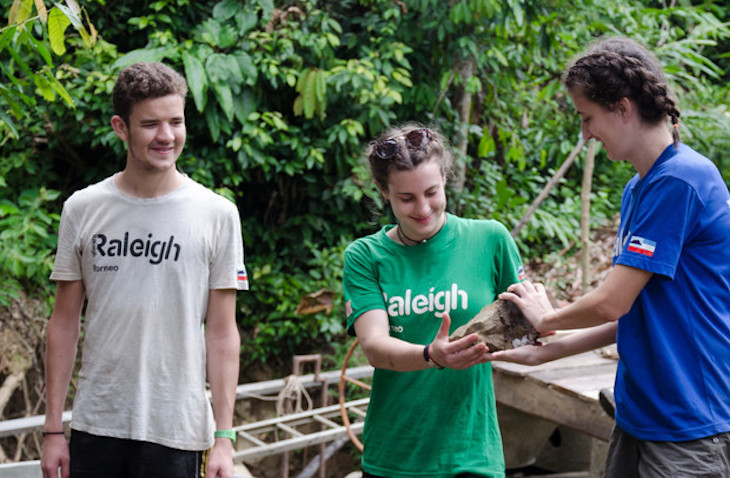
For more than 30 years, Raleigh International has offered trips for high school students to visit and volunteer in Nepal, Nicaragua, Costa Rica, and Tanzania. Projects focus on clean water and hygiene, sustainable use of natural resources, and community building, and each of Raleigh’s programs incorporates a youth leadership and development component as a way to engage young volunteers and their counterparts in the countries that they serve. With a commitment to quality and support, Raleigh International helped design and currently holds the BS8848 Safety Standard for organizing and managing visits, fieldwork, expeditions, and adventurous activities outside of the UK – and so far, 400,000 young volunteers have traveled with Raleigh International, with another 800 expected to sign up this year. If you’re looking for a great volunteer experience for your summer or spring break, or a gap year before enrolling in college, Raleigh International offers a wide variety of volunteer experiences with a real impact led by multicultural and multinational teams.
If you’re looking for a summer break adventure, check out Raleigh International’s Tanzania expedition. On this trip, you will be able to combine volunteering and adventure by helping out with community development and environmental projects, plus picking up wilderness survival skills on a trek to the Southern Highlands. Volunteer work can include planting trees, improving access to clean water, and helping with hygiene awareness events. You also will be able to see animals up close on a trip to Ruaha National Park on this expedition, which lasts five, seven, or 10 weeks. Learn more and sign up here!
One excellent organization that’s perfect for teen and high school travelers is Global Leadership Adventures, which is the top-ranked teen-focused volunteer program on Volunteer Forever. Founded in 2004, Global Leadership Adventures combines community service, hands-on learning, and adventure travel.
As a youth-centered organization, GLA places a great emphasis on safety and support, which you can see outlined in its five-point safety system. And as a forerunner in international service learning, Global Leadership Adventures has a database of nearly 2,000 references willing to vouch for the impact of their programs – in fact, the organization’s co-founder was recognized by President Obama for making a positive impact in Africa. Click here to learn more about under-18s projects with Global Leadership Adventures!
If you want to do more with your spring break, check out Global Leadership Adventures’ Spring Break Adventure in the Dominican Republic. Through this program, you’ll volunteer to build schools and community centers, and help with reforestation or water filtration projects, plus have the chance to visit beaches, explore freshwater lagoons and underwater caverns, and much more. This eight-day program costs $1,899, and 2017 dates are now open for registration – click here to learn more.
What Volunteers Say: Review from Elizabeth
Last summer, in between my Sophomore and Junior year of high school, I had the pleasure of traveling to the Dominican Republic. I would strongly recommend this trip to anyone looking to do global community service.
The schools that we made (using bottles for insulation) truly made an impact on me because I felt like I was doing something for a new community! Additionally, we did fun activities like zip lining and snorkeling. This trip did an awesome job combining fun with service.
Additionally, there was not one time during the trip where I felt unsafe. We were always provided with clean water, knowledgeable mentors, and safe transportation. Finally, this program established people who were culturally-aware. My eyes were opened to a new culture and I was enriched with new experiences. Again, I would recommend this to anyone who is thinking about doing on a service trip!
Since 2010, Reach Out Volunteers has provided culturally rich and high-impact volunteer programs for travelers who want to make a difference in impoverished communities, help endangered wildlife, and much more. To date, about 3,500 travelers have signed up with Reach Out Volunteers, with an additional 1,000 expected to embark on trips in 2017.
Reach Out Volunteers also prides itself on the sustainability of its programs, with all projects initiated by the communities in which they work, and all programs employing local, skilled laborers to work alongside their volunteers. For teens and high school students 17 years old and younger, Reach Out Volunteers invites you to sign up if you have written permission from a parent or guardian or if you’re traveling with a legal guardian.
Depending on the program you sign up for, Reach Out Volunteers’ program fees start from $1,599 for a two-week trip, and includes airport pick-up and drop-off, ground transport, food, housing, excursions and activities, project materials, educational materials, and much more.
If you’re looking for a unique summer vacation, Reach Out Volunteers is offering a month-long South Africa Volunteering Adventure where you’ll be able to volunteer at a local daycare center and at wildlife sanctuaries and parks. Through this program, you’ll help teachers with their lessons and help renovate classrooms at a day care center, and later have the chance to learn about animal conservation, tracking, and much more at sanctuaries and preserves for cheetahs, elephants, rhinos, and other game. In addition to your volunteer work, you’ll be able to go surfing, explore the St. Lucia UNESCO World Heritage Site, go shopping in local markets, visit a Zulu village, and much more. Click here to learn more and to sign up: www.rovolunteers.com/africa-volunteer-programs.htm
If you’re looking for a shorter placement, check out Reach Out Volunteers’ volunteer program in Peru, where you’ll have the wonderful opportunity to visit Cusco, Machu Picchu, and much more. As a volunteer, you’ll work with a village to build greenhouses, which help to extend the short growing season to add to the community’s food supply – a vital service for families whose children are at risk of malnutrition. During your stay in Peru, you’ll take cooking lessons, go zip lining, hike Machu Picchu, and lots more. To apply, please visit: https://www.rovolunteers.com/Volunteer-Machu-Picchu-Inca-Trail.htm
Volunteering Journeys got its start in 2014, and is growing quickly, offering volunteer abroad placements in India, Thailand, Nepal, Cambodia, South Africa, Sri Lanka, and Bali.
Volunteering Journeys’ founding story informs and inspires the work carried out by its team and travelers every day: after quitting her job as an investment banker, founder Ridhi Patel took time off in 2009 to volunteer for three months in South Africa. This life-changing experience encouraged her to build a volunteer organization in her home country of India, where she could bring together travelers who wanted to explore the world, give back to their host communities, and learn more about themselves along the way.
Volunteering Journeys prides itself on personal attention and tailored experiences for all participants, as well as high-quality service and placements that actively engage scientists, doctors, teachers, and community leaders. Right now, Volunteering Journeys is offering many different opportunities for teen and high school travelers, including family volunteer holidays, summer volunteer programs, and teen-friendly placements on many different projects in Africa and Asia.
One excellent volunteer opportunity for volunteer work for teens is Volunteering Journeys’ construction program in India, Nepal, or Thailand. The purpose of these programs is to build better homes and lives for communities in need, whether it’s through rebuilding houses, churches, schools, day care centers, or other structures. From two-week house building programs in Thailand, to earthquake reconstruction in Nepal, to school construction and renovation in India, there’s lots of opportunity for you to make a positive impact no matter your age. Learn more and sign up here!
Another volunteer opportunity you should definitely check out is Volunteering Journeys’ sea turtle program in Sri Lanka. This program focuses on rehabilitating endangered sea turtles, including green turtles, hawksbills, loggerheads, leatherbacks, and the olive ridley turtle. Perfect for volunteers of all ages, this program invites you to work alongside marine biologists and conservationists to collect data and help with vital research through marine life monitoring, safeguarding eggs, beach cleanup, and releasing hatchlings into the wild. Learn more and sign up here!
If you’re planning a winter, spring, or summer break abroad, Volunteering Journeys’ winter and summer volunteering program in India should be on your radar. For three weeks, you will have the chance to pursue an incredible adventure where you’ll visit amazing sites in India, volunteer with a community in need, and learn about the cultures of this country. You’ll spend your first two weeks in Kerala, where you’ll volunteer in one of three different programs: English teaching, working with disabled children, or supporting a women’s empowerment initiative, all of which contribute to life skills development and self-confidence for the people you’ll work with. During your third week, you’ll go on a Golden Triangle tour of North India, where you will visit Delhi, Agra, and Jaipur, including a stop at the Taj Mahal, and much more. Click here to learn more and to sign up!
Founded in 1984, Global Volunteers invites travelers – including high school and college groups – to embark on volunteer vacations and teach abroad placements in 17 countries around the world. Global Volunteers truly makes a difference in the 200 communities in which they work: in 1999, they were granted Special Consultative Status with the United Nations, and in 2008 formalized a relationship with UNICEF.
Global Volunteers also emphasizes safety on all of their projects, with CPR and first aid certification provided to team leaders, emergency medical evacuation insurance provided for volunteers serving outside of the US, and emergency contact available 24 hours a day, seven days a week. Depending on where you’d like to go, Global Volunteers’ placements start from $1,045 for your first week abroad.
On this program, Global Volunteers invites school groups to take on service-learning and volunteer projects in Costa Rica. Through a partnership with the Santa Elena Cloud Forest Reserve, your group can help with maintenance and development of the reserve while learning about organic farming, rural tourism, conservation, and gastronomy. During your weekends and free time, you’ll be able to take Spanish lessons, learn Costa Rican history and culture, go horseback riding, and much more. Learn more and sign up at: https://globalvolunteers.org/costa-rica
If you want to visit Europe, check out Global Volunteers’ Greece volunteer program, where your high school or college group can teach conversational English to local students, encourage young adults with special needs, or support children who have been displaced from their homes.
Along with your volunteer experience, you’ll be able to participate in local Cretan dance and music, learn raki making, and truly immerse yourself in the culture while learning some basic Greek language, learning about customs, and much more. Volunteer placements in Greece are customizable to your group’s schedule and goals so you can gain the most from your experience. Learn more and sign up at: https://globalvolunteers.org/greece
Global Volunteers also is offering an amazing opportunity to volunteer in Cuba, where you’ll travel to Havana, Ciego de Ávila, or Sancti Spíritus to work alongside community partners to practice conversational English, tend community gardens, improve local buildings, help women with sewing and other crafts, and much more. You’re invited to sign up for one week or longer (starting at $2,595), and in between project work, you’ll have the chance to engage in people-to-people cultural and educational exchange activities.
On Global Volunteers’ St. Lucia volunteer program, you’ll support children who are facing challenges in nutrition, healthcare, and education. In partnership with local schools and community organizations, you’ll provide maternal and infant support, present childcare workshops to parents, help with early childhood education, teach health and hygiene lessons, assist with building repair and maintenance projects, tend school gardens, and much more. This project starts from one week at $2,695, with family and group opportunities available as well.
Other Programs to Consider
International Student Volunteers (ISV): ISV also has a five-star rating at Volunteer Forever, with sustainable development and conservation programs offered worldwide. University students may be eligible for academic credit for participating as well. Learn more and read reviews here.
Beyond Student Travel: With programs in China, Colombia, Costa Rica, Fiji, Panama, and Zambia, Beyond Student Travel programs a wide variety of youth volunteer abroad projects for high school students wanting to volunteer and see the world. Most projects last two to three weeks, and incorporate service learning, career building, language learning, and leadership. Click here to learn more.
Walking Tree Travel: Walking Tree offers internships, alternative breaks, and other volunteer projects in English teaching, environment, community development, and lots more in a dozen countries. With a mission to inspire individuals to become global citizens and take an interest in the world around them, Walking Tree Travel provides trips geared towards volunteer opportunities for high school students that actively engage travelers within their host communities. Click here to read more.
Envoys: With volunteer and study opportunities for middle- and high-schoolers, Envoys blends education, research, and international travel for a one-of-a-kind learning experience. Projects range from environment, to ecotourism, to community development, and beyond. Learn more about Envoys here.
Amizade: Amizade offers service learning, volunteer, and skills-based programs worldwide for teens and young adults. While Amizade’s service learning projects are available only at the university level, volunteer opportunities for high school students, alternative spring breaks, and other volunteer opportunities are available to teens. Learn more here.
As you can see, there are tons of great volunteer abroad opportunities outside of the Peace Corps (which requires participants to be 18 and older) that are available fto younger volunteers—they’re an excellent way for your teen to learn more about the world, build incredibly useful skills, and work with a community program that’s tackling local issues, all while providing an adventure of a lifetime. And as with any volunteer abroad project (perhaps even more so in this case), it’s very important to take your time and do your homework to find an organization that has appropriate placements for students who can contribute the very best they can to a great cause.
Big heart, but little wallet?
Check out our list of affordable volunteer organizations.
P.S. If you’re still looking for a volunteer opportunity, check out our list of best volunteer abroad programs and recommended volunteer projects in Africa, Central America, and Thailand. You can also read about 7 Great Medical and Veterinary Volunteer Abroad Projects, 10 Dental Volunteer Abroad Program and Medical Mission Tips for Pre Dental Students, and nursing volunteer abroad projects for students and nurse professionals. Or, if medical volunteer projects aren’t for you, be sure to read about our sports and coaching volunteer abroad, wildlife conservation and veterinary abroad, teach abroad, and intern abroad programs. Lastly, if you’re under 18, you may be interested in a teen volunteer abroad program from one of our many great partners.


















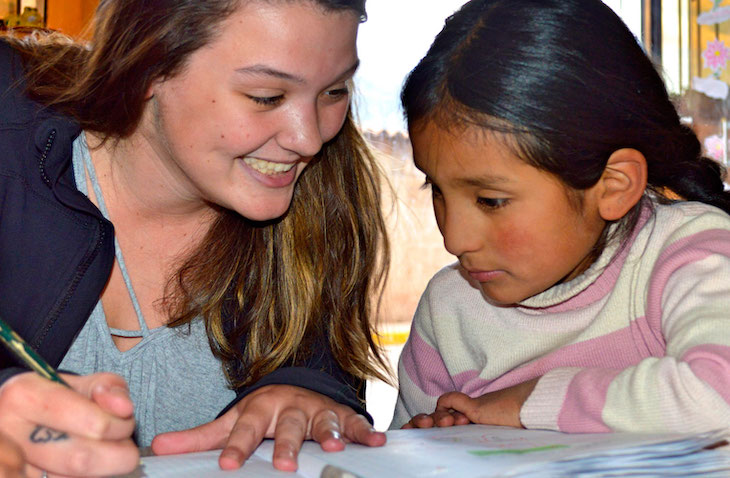

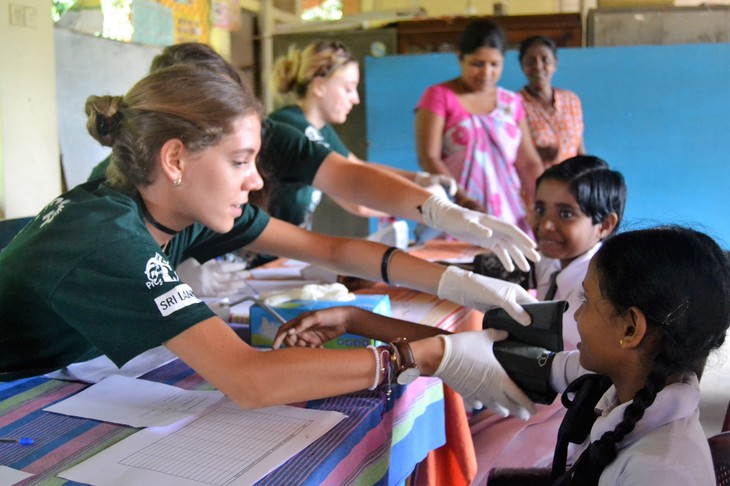

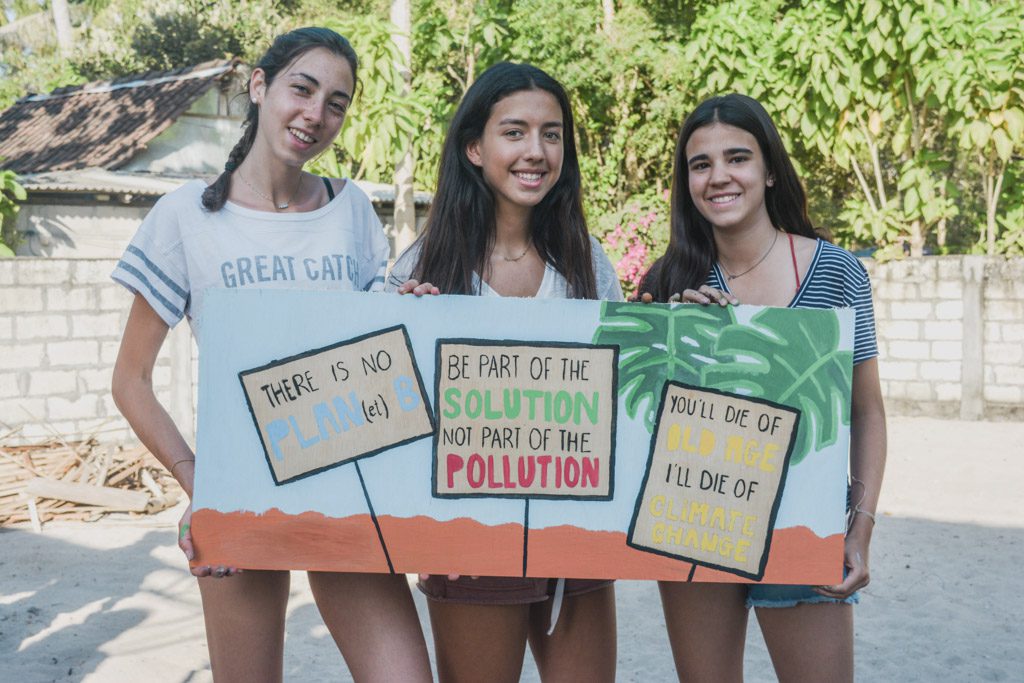
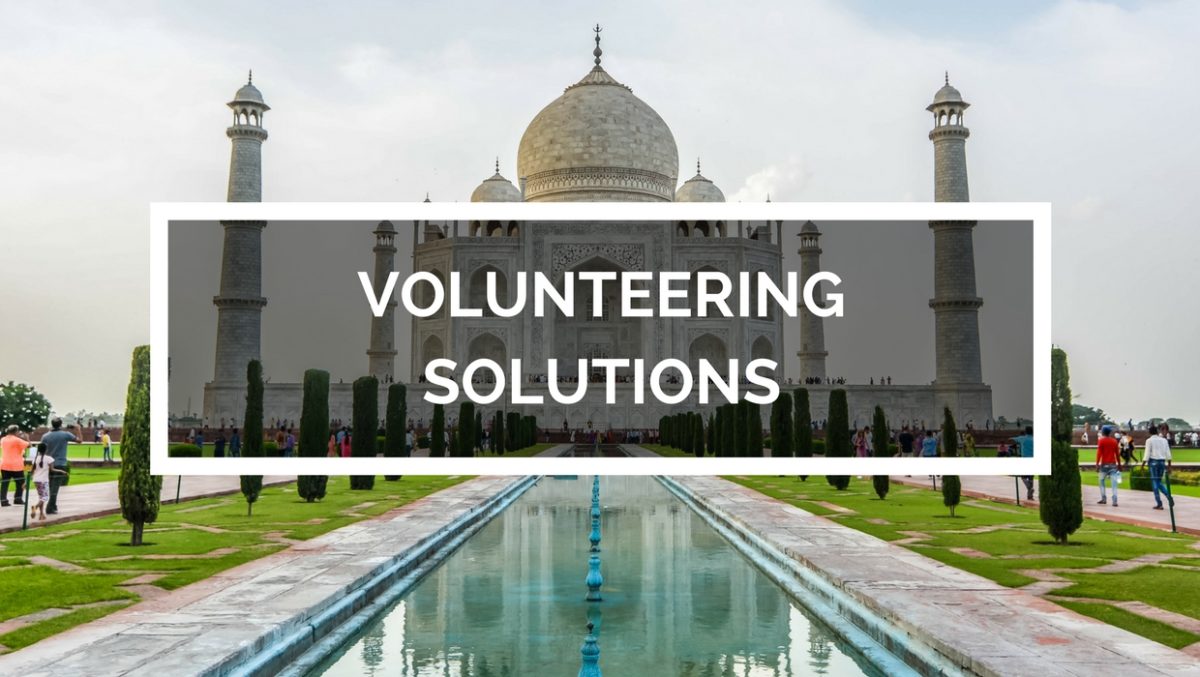
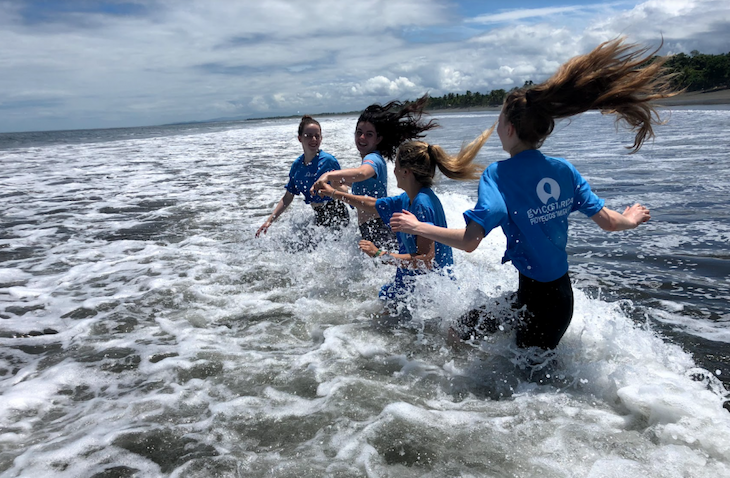
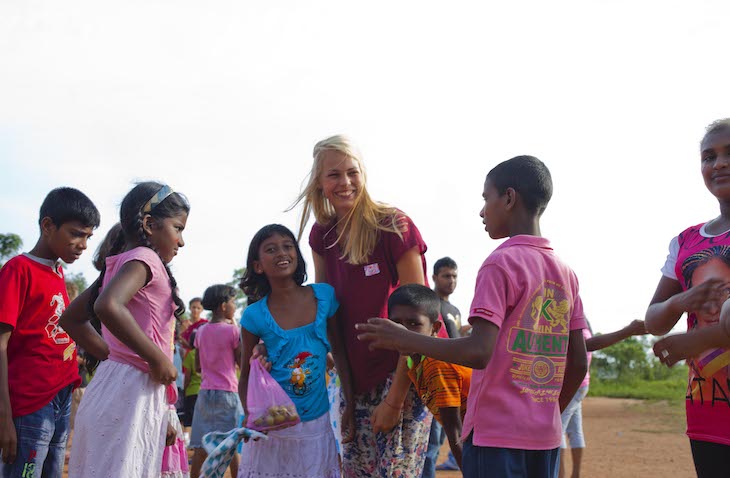
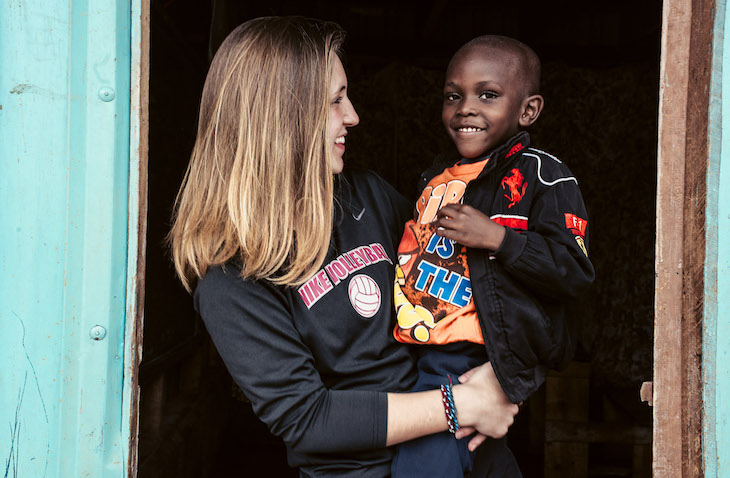
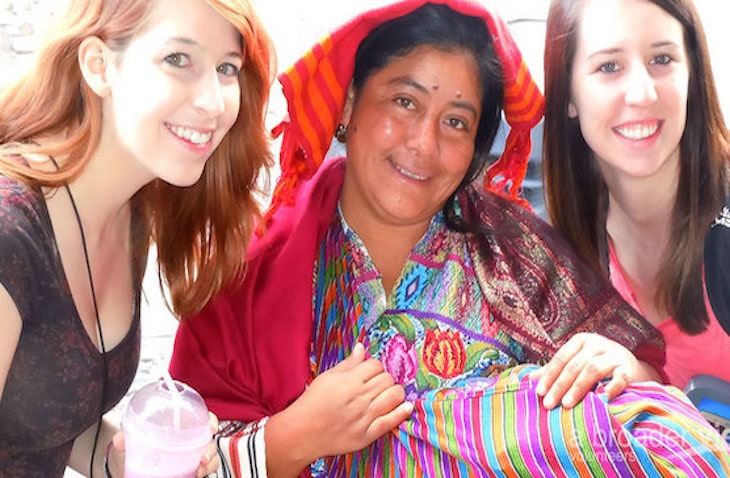




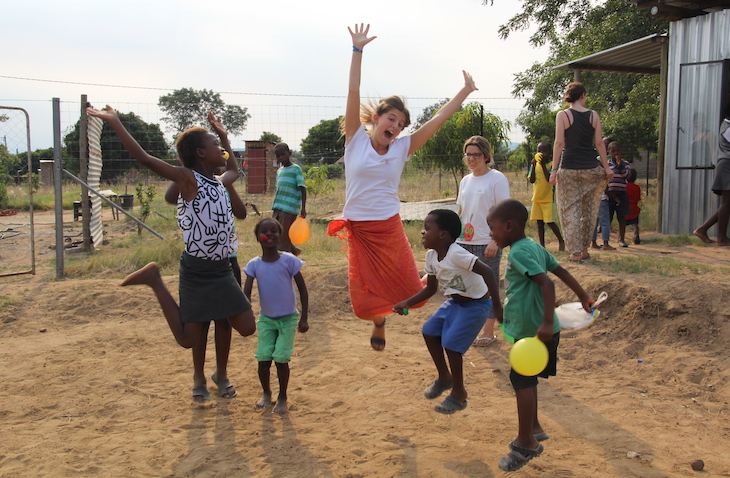











Sarah Vandenberg · Director of Partnerships
Sarah has worked as a researcher and consultant in the volunteer travel world since 2004. With a BA from the George Washington University and background working with both public and private sector volunteer organizations, she enjoys exploring the world and collecting and sharing stories, trends, and advice with travelers who want to volunteer, intern, or teach abroad.